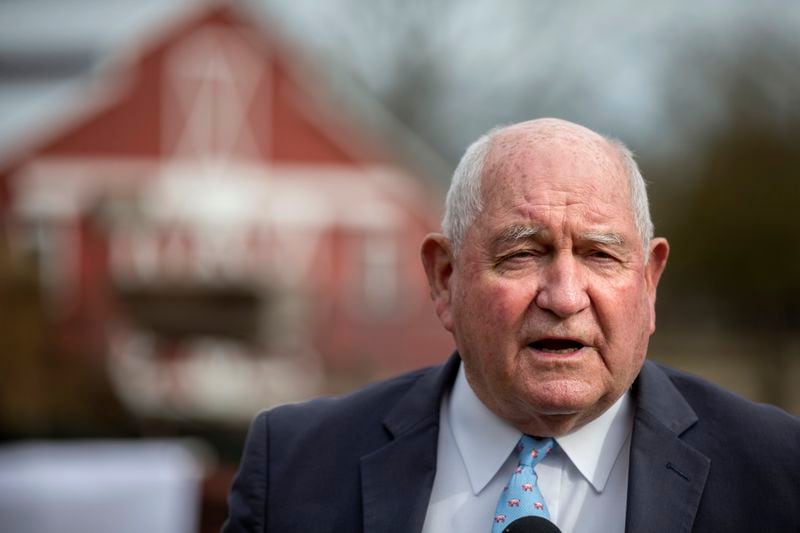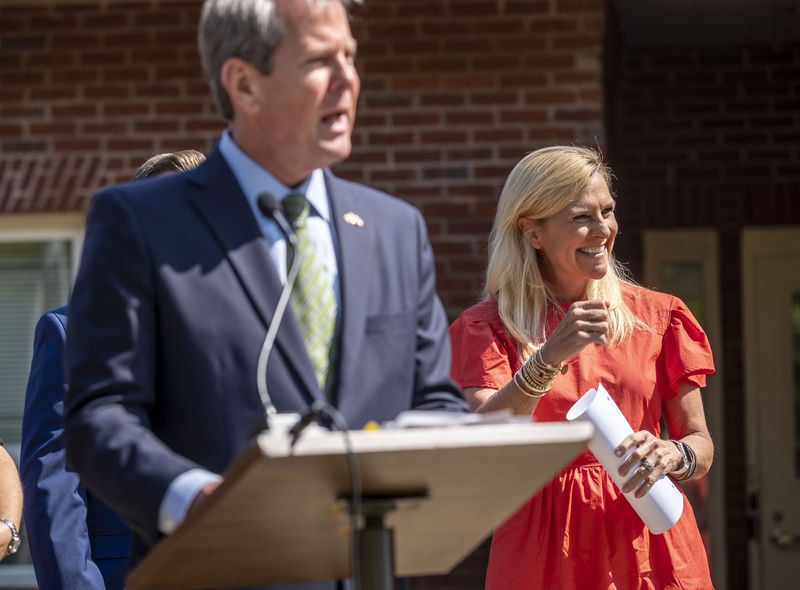Steps proposed to deal with ‘Confederacy issue’
Stone Mountain Park, with its deep ties to the past as the world’s largest Confederate monument, could be looking at a much different future.
Proposals call for confining tributes to the Confederacy to a designated area within the park and creating an exhibit “telling the truth” about Georgia’s most visited tourist attraction.
Bill Stephens — CEO of the Stone Mountain Memorial Association, the state authority that oversees the park — presented the ideas this past week to the association’s board.
The proposed exhibit would detail the history of the mountainside carving of Confederate President Jefferson Davis and Gens. Robert E. Lee and Stonewall Jackson, as well as the site’s links to the second Ku Klux Klan.
The plan also calls for renaming some buildings and other features, shedding their connections to the Confederacy.
Stephens recognized that he was in a tight spot, saying that nobody will likely be happy with the suggestions that go too far for groups such as the Sons of Confederate Veterans and fall well short of what many activists and Democratic state lawmakers have sought.
But, he said, he’s trying to find a “reasonable, commonsense middle ground” that also complies with state laws that protect Confederate monuments.
Those monuments would all be moved to a 40-acre section of the 3,400-acre park.
The association’s nine-member board, which will have final say on the proposals, met for the first time under its new chairman, Abraham Mosley.
The board did not vote on the proposals, but Mosley — a longtime pastor from Athens who last month became the first African American to serve as chairman — called them “a first step toward a lot of good things to come here at Stone Mountain Park.” He added that “it’s just going to take time to get there.”
The park has faced calls for change for years, but those demands intensified following nationwide protests last year over police killings of Black men and systemic racism.
Money is also a concern.
Park revenue was about $49 million in 2019, Stephens said. It fell to about $22 million last year. The COVID-19 pandemic was responsible for much of the drop-off, but the park has also lost sponsorships, as well as conventions and other events, due to “the Confederacy issue.”
Stephens said key vendors plan to pull out of the park next year. He said he’s held preliminary talks with five potential replacement vendors, who have all said “that unless we do something about the Confederacy issue they’re not going to bid.”
Credit: Stephen B. Morton for The Atlanta Journal Constitution
Credit: Stephen B. Morton for The Atlanta Journal Constitution
Potential pick of Perdue to head USG stirs new resistance
If the Board of Regents names former Gov. Sonny Perdue as the next leader of the University System of Georgia, it could hit students and parents in their checking accounts.
The Southern Association of Colleges and Schools Commission on Colleges sent a letter to Regents Chair Sachin Shailendra warning that the University System could be found “out of compliance” if the process of picking the next leader is politicized.
“While it is often especially difficult for members of a governing board who are appointed by the Governor or legislative body to remain independent in their work, it is imperative that they do, or they place the accreditation of the institution(s) they govern in jeopardy,” the agency’s president, Belle Wheelan, stated in the letter The Atlanta Journal-Constitution obtained through a public records request.
The consequences could be severe. The agency could go as far as revoking the accreditation of a college or university, which would prevent its students from receiving federal financial aid.
Wheelan also wrote that her agency requires higher education systems to select candidates with “appropriate experience and qualifications” to lead institutions. Perdue has no experience in higher education leadership, which has also prompted objections from some faculty and students.
She suggested the board appoint an interim leader if it can’t find an appropriate candidate before the current chancellor, Steve Wrigley, retires in July.
The potential appointment of Perdue has faced other opposition. The Board of Regents last week paused the search for the next chancellor hours after the AJC reported some members opposed Perdue’s candidacy. The 19-member board did not say how long the search would be paused.
Perdue and his aides have not publicly commented on the search. Shailendra and other Regents have also declined to comment on the process.
Perdue, who was most recently the secretary of agriculture in the Trump administration, heads a potent political network, and he has close ties to Gov. Brian Kemp. As governor, Perdue picked Kemp in 2010 to fill the open post of secretary of state, giving him a leg up over Republican rivals in that year’s primary. And then-President Donald Trump credited Perdue with helping persuade him to endorse Kemp during the 2018 GOP runoff for governor, a key to his runaway victory over Casey Cagle.
Kemp’s office said in a statement to the AJC that it respects the board’s autonomy and shares “similar concerns” with the accreditation agency about the search, adding that “a minority of Board of Regents members may be controlling or influencing key decisions of this critical personnel process without input from the majority of the Board.”
Collins chooses to stay on the sideline in 2022
Doug Collins made news in 2020 when he ran against a fellow Republican, then-U.S. Sen. Kelly Loeffler.
The former congressman made news this past week when he opted not to run against Democratic U.S. Sen. Raphael Warnock.
Collins said he won’t be running for any public office in 2022, meaning the staunch ally of Donald Trump is also rejecting the former president’s call to run against Republican Gov. Brian Kemp.
“This is goodbye for now, but probably not forever,” Collins told supporters on Twitter.
Collins had been seriously considering another campaign for the Senate after finishing third in the 2020 special election that went to Warnock and helped give Democrats control of that chamber.
But the private sector also appealed to him. He just started a new conservative talk show and joined a North Georgia law firm.
If he had chosen to run, Collins would have become the biggest name in the Republican Party to enter the race so far. Former U.S. Sen. David Perdue announced earlier this year that he would not make a bid to return to Washington. Other potential GOP candidates, such as Loeffler, Agriculture Commissioner Gary Black and U.S. Reps. Buddy Carter and Drew Ferguson, have apparently turned their eyes toward Texas, where University of Georgia football legend Heschel Walker is mulling a return to his home state to make a run with the encouragement of Trump.
Two military veterans — Kelvin King and Latham Saddler — have entered the race for the GOP’s Senate nomination.
Credit: Alyssa Pointer / Alyssa.Pointer@ajc.com
Credit: Alyssa Pointer / Alyssa.Pointer@ajc.com
Republicans call Abrams rewrite a ‘stealth edit’
Republicans are accusing Democrat Stacey Abrams of a “stealth edit” after she altered a column she wrote saying she did not believe a boycott was the proper response, at that time, to restrictions in Georgia’s new voting law.
USA Today, which ran the column online March 31, says in an editor’s note that it asked Abrams to update the piece in time for print editions after Major League Baseball moved its All-Star game out of metro Atlanta in response to the new election rules.
Abrams’ camp says the alterations do not represent a shift in her opinion, but Republicans have accused her of doing just that. They also have slammed USA Today for allowing the changes to the column.
In the column, Abrams originally wrote, “Until we hear clear, unequivocal statements that show Georgia-based companies get what’s at stake, I can’t argue with an individual’s choice to opt for their competition.”
The revision replaced that paragraph with this:
“Rather than accept responsibility for their craven actions, Republican leaders blame me and others who have championed voting rights (and actually read the bill).”
Some conservative outlets have seized on the differences, saying Abrams is trying to change her position on the boycott movement. But Abrams’ team notes that she was on the record repeatedly ahead of the decision to move the game and says that both versions of the column make her stance clear.
“While Georgia Republicans make it harder for people of color to vote and chase dollars and jobs out of our state as a result, Stacey Abrams continues to encourage events, productions and businesses to come to Georgia and stay in Georgia — as she did in both the online and the print editions of the USA Today op-ed,” Abrams spokesman Seth Bringman said.
Gov. Brian Kemp, who will likely face Abrams next year in a rematch of their tight battle for the governorship in 2018, sees it a little differently.
“Can’t say I’m surprised,” he tweeted. “The left spends weeks spreading lies and promoting boycotts, and their pals in the national media cover their tracks. Stacey Abrams can’t have it both ways. Hardworking Georgians deserve the truth.”
Credit: TNS
Credit: TNS
Voting lawsuits now number half-dozen
Georgia’s new voting law continues to keep the courts busy.
The election regulations this past week drew their sixth federal lawsuit, this one alleging that the law makes it harder for Black, Latino and Asian American voters to vote.
Plaintiffs in the suit include the Concerned Black Clergy of Metropolitan Atlanta, New Birth Missionary Baptist Church and the Faith in Action Network.
The plaintiffs object to strict limits on drop box availability, a deadline to request absentee ballots 11 days before election day, a reduction in early voting before runoffs, ID verification requirements of voters who lack a state ID, bans on early voting buses and a prohibition on handing out food and water to voters waiting in line.
“The law is plain and simple voter suppression, aimed at making it harder for Black and brown voters and voters of faith to have a voice in our democracy,” said Richard Morales, policy director for the Faith in Action Network.
State legislators who supported the law have said it treats all voters equally and will improve voter confidence in elections.
Credit: Alyssa Pointer / Alyssa.Pointer@ajc.com
Credit: Alyssa Pointer / Alyssa.Pointer@ajc.com
First lady a first-rate advocate on human trafficking
Georgia first lady Marty Kemp could be among the most adept wheelers and dealers under the Gold Dome.
“As I’ve told folks every session, some of the only bills that ever get unanimous passage are Marty’s,” Gov. Brian Kemp said this past week at bill-signing ceremony. “I’m still very confused by that, and believe you me, she reminds me often of that.”
The governor signed three bills targeting a top concern of the first lady, human trafficking.
- Senate Bill 33 allows victims or state officials to sue for damages against traffickers and “bad actors” who know about the crimes.
- Senate Bill 34 lets victims seek a name change privately.
- House Bill 287 includes a provision to educate students starting in sixth grade about human trafficking.
Marty Kemp worked with lawmakers in writing and promoting the legislation.
“It’s a heinous crime. I don’t think anybody can argue that. I hope not,” said the first lady, who helms the Grace Commission to vet ideas. “So it’s certainly bringing both sides to the table and talking about how we can make Georgia better and help the ones that are vulnerable.”
Credit: TNS
Credit: TNS
New tax lodged on Airbnb, rivals
Airbnb, VRBO and other short-term rental companies — or their customers — will soon be paying hotel taxes in Georgia.
Gov. Brian Kemp signed into law House Bill 317, requiring home rental companies to collect Georgia’s $5-per-night lodging tax, as well as local excise taxes as high as 8%. It takes effect at the beginning of the state’s new fiscal year on July 1 — just in time for summer vacation.
It’s the latest effort by the state to tax online companies that do business here, following laws passed in recent years that tax Uber, Amazon and other internet retailers.
Traditional hotels, taxis and retailers supported taxing their internet competitors, while local governments wanted the additional revenue.
The new tax is expected to bring in $17 million for the state in fiscal 2022, according the state auditor. The Association County Commissioners of Georgia estimates $20 million to $30 million could be coming to local governments through hotel excise taxes.
Extended-stay rentals, which last more than 30 days, are exempt from the $5-per-night lodging tax.
Candidates, endorsements, etc.:
— State Rep. Matthew Wilson, D-Brookhaven, opened his campaign for state insurance commissioner. The current commissioner, Republican John King, launched his campaign earlier this month.













